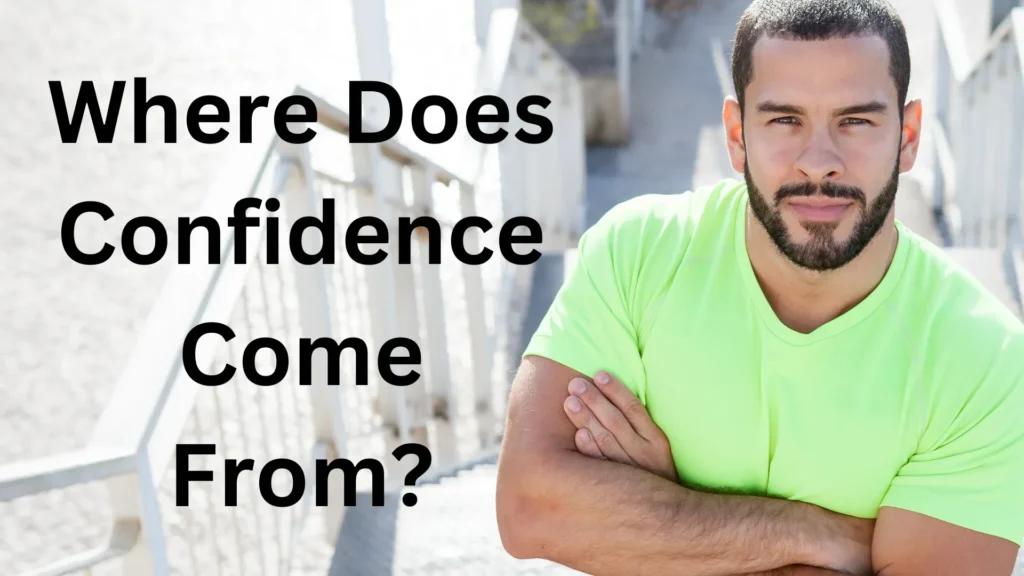
Confidence! It’s that secret sauce making athletes shine under those bright stadium lights.
But ever wonder, from a sports psychologist’s point of view, what’s the deal with confidence?
Let’s dive into this intriguing world, keeping things light and breezy.
Buckle up!
What is confidence?
Think of confidence as your inner cheerleader.
It’s that little voice telling you, “You’ve got this,” when the pressure’s on.
But it’s not just blind optimism.
Confidence is your belief in your ability to nail something, whether it’s a free throw or a presentation.
Confidence, in its essence, is that spark inside that lights up when you’re facing a challenge head-on.
Imagine standing at the edge of a high dive, your heart pounding.
Confidence is what nudges you to take that leap.
It’s more than just believing in yourself; it’s an unwavering trust in your abilities, skills, and preparation.
But here’s a twist: confidence also comes from knowing your limits.
It’s recognizing what you can do and understanding that it’s okay to be a work in progress in other areas.
This blend of self-awareness and belief in one’s abilities creates a powerful mix that fuels perseverance and resilience.
Interestingly, confidence has a contagious vibe.
When you carry yourself with confidence, it not only uplifts your performance but can also inspire those around you.
It’s like setting off a positive chain reaction, whether on a sports team, in a work setting, or even within your circle of friends.
So, in a nutshell, confidence is your inner compass guiding you through the storms and sunny days alike.
It’s knowing you’ll make it through, even when the path isn’t clear.
And when you stumble?
Confidence is the hand that picks you up, dusts you off, and says, “Let’s try again.”
How is confidence helping us?
Confidence is like a power-up in a video game.
It boosts your performance, helps you tackle challenges head-on, and keeps those pesky nerves at bay.
It’s the difference between freezing up and scoring that game-winning goal.
Pretty cool, right?
Imagine confidence as your invisible armor.
It doesn’t make you invincible, but it definitely helps you stand a bit taller and face the dragons of daily life.
In sports, confidence transforms pressure into fuel.
Instead of buckling under the weight of a final shot, a confident athlete sees it as an opportunity to shine.
But, confidence doesn’t just affect performance. It influences how we prepare.
A confident mindset leads to more focused training, detailed goal-setting, and a proactive approach to overcoming obstacles.
It’s the difference between half-hearted practices and pushing yourself to the limit because you believe in the payoff.
Confidence also plays a crucial role in how we bounce back from setbacks.
With a strong sense of self-belief, a setback is not a roadblock but a detour.
Confident individuals are more likely to view failures as learning experiences, which fuels growth and resilience.
This resilience is key in sports, academics, and, well, life in general.
Moreover, confidence affects our interactions and relationships!
It allows us to communicate more effectively, stand up for ourselves, and inspire others.
A confident person can rally a team, lead by example, and create an environment where everyone feels empowered to give their best.
Lastly, let’s not overlook the impact of confidence on mental health.
It acts as a buffer against stress, anxiety, and fear.
Confident individuals are more likely to tackle challenges head-on rather than avoiding them, reducing feelings of helplessness and boosting overall well-being.
In essence, confidence is like a Swiss Army knife for life.
It equips us with the tools to excel, overcome, and grow, regardless of the arena we find ourselves in.

Where does confidence come from?
Confidence isn’t something you’re born with, like blue eyes or curly hair.
It’s built through experiences, successes, and even the way we talk to ourselves.
Ever nailed a tricky shot and felt like a million bucks afterwards?
That’s confidence brewing.
But there’s a lesser-known secret.
Confidence also comes from our preparation.
Athletes who train hard and smart often have a stronger belief in their abilities.
It’s not just about physical readiness. It’s about knowing you’ve done everything possible to succeed.
Diving deeper, it’s fascinating to see the roots of confidence sprawl in various directions, intertwining experiences, thoughts, and even our physiology.
Beyond the triumphs and affirmations, confidence has a unique relationship with our brain chemistry.
Achievements, no matter how small, can trigger a release of dopamine, that feel-good neurotransmitter.
This chemical reward not only makes us feel great but reinforces our willingness to take on challenges, fostering a cycle of confidence building.
Another less discussed origin of confidence is the role of social support.
The encouragement from coaches, family, and friends acts like sunlight for a plant, essential for growth.
Positive reinforcement and constructive feedback help to sculpt our self-perception and belief in our capabilities.
It’s this network of support that can ignite the spark of confidence in someone, even when they’re struggling to light it themselves.
Mentorship and role models also play a pivotal role.
Seeing someone you admire navigate challenges with grace and determination can serve as a powerful blueprint.
It sends a message that success is achievable, and challenges are surmountable, laying down a psychological roadmap for us to follow.
Let’s not forget about the influence of our internal dialogue.
The conversations we have with ourselves can either be a source of empowerment or our own worst enemy.
Cultivating a habit of positive self-talk and mindfulness can steer our confidence in the right direction.
It’s about transforming our inner critic into an inner coach.
Lastly, confidence can sprout from the process of learning and mastery.
Diving into new skills, absorbing knowledge, and gradually improving provides tangible evidence of our capabilities, reinforcing our self-belief.
It’s in this continuous cycle of learning, failing, and succeeding that confidence finds fertile ground to grow.
So, confidence is not just a product of individual achievements but a complex blend of biological, social, and psychological factors.
Understanding this can help us nurture our confidence more effectively, knowing it’s a multifaceted phenomenon deeply rooted in our nature and nurture.
When is confidence a bad thing?
Yes, there’s such a thing as too much confidence.
Ever heard of overconfidence?
It’s when you think you’ve got it all figured out, and then, boom, reality check.
Overconfidence can make you underestimate challenges or skip important prep.
Finding the sweet spot is key.
Believe it or not, confidence can cross over to the dark side.
When?
Well, when it morphs into overconfidence.
Overconfidence is like adding too much sugar to your coffee. It overshadows the original flavor and can leave a bitter aftertaste.
It happens when our belief in our abilities far exceeds reality.
This mismatch can lead us into tricky situations, underestimating challenges and overestimating our readiness.
A key arena where overconfidence shows its downside is in decision-making.
With too much of it, there’s a tendency to skip due diligence, ignore valuable advice, and dismiss potential risks.
It’s like running with blinders on. You might move fast, but you’re more likely to crash.
In team dynamics, overconfidence can also play the villain.
It can lead to dominating conversations, under-valuing team members’ input, and fostering an environment where collaboration takes a backseat.
This not only hampers team performance but can erode trust and respect among members.
Moreover, overconfidence can stifle growth and learning.
When you think you know it all, the motivation to learn and improve dwindles.
This can be particularly detrimental in fast-evolving fields or competitive sports, where continuous learning is key to staying on top.
But here’s a twist: overconfidence can sometimes be contagious.
If a leader is overconfident, this attitude can trickle down, leading to a collective blindness to potential pitfalls.
It’s like sailing a ship with everyone on deck convinced there are no icebergs ahead.
The trick, then, is not to shun confidence but to cultivate a balanced version of it.
This means pairing confidence with humility and openness to feedback.
It’s about recognizing that without grounding and a realistic assessment of situations and abilities can lead us astray.
In essence, the goal is to harness the strength that confidence offers while staying vigilant to its potential to cloud judgment.
Like many things in life, it’s all about finding that sweet spot.

Exercises to boost confidence
Now for the fun part. Want to boost your confidence?
Here is a short version of these exercises and if you want the longer, more in depth version of confidence building exercises, click here.
Before a big moment, close your eyes and picture yourself succeeding.
Feel every detail, from the cheers to the sweat. It’s like a rehearsal in your mind.
Sounds quirky, but standing like a superhero for a few minutes can actually boost your confidence.
Try it before your next big moment.
Nailed a practice session?
Celebrate it!
These little victories add up and boost your confidence bit by bit.
Be mindful of how you talk to yourself.
Swap “I can’t” with “I can” or “I’ll try.”
Words are powerful!
Instead of beating yourself up over failures, dissect them.
What went wrong?
How can you improve?
This turns setbacks into stepping stones.
Confidence is a journey, not a destination!
It’s about embracing the ups and downs, learning from them, and always pushing forward.
So, lace up those sneakers, flex that mental muscle, and let your confidence soar.
You’ve got this!
Conclusion
So, there you have it, the lowdown on confidence from a sports psychologist’s corner.
It’s a mix of mind, body, and the people around us.
Pretty cool, huh?
Remember, confidence is your secret weapon!
But keep it real, and don’t let it turn into your kryptonite!
Now, if you’re looking to level up your game, that’s where the Success Stories Community comes in.
It’s a place where I hang out, ready to help you hit those high notes.
You’ll find tons of resources and folks just like you.
We’re all about sharing wins, lessons, and that much-needed push.
And the best part?
You’re not going it alone!
Imagine having a squad backing you, every step of the way.
That’s what we’re here for.
So, come join the fun.
Let’s turn those goals into gold medals, together!



